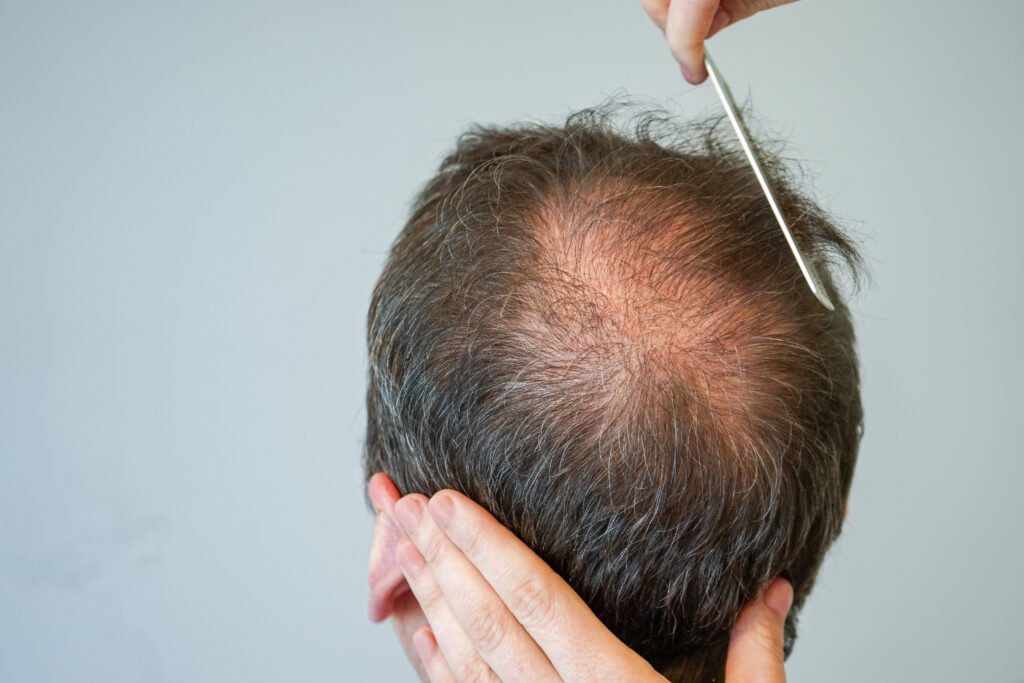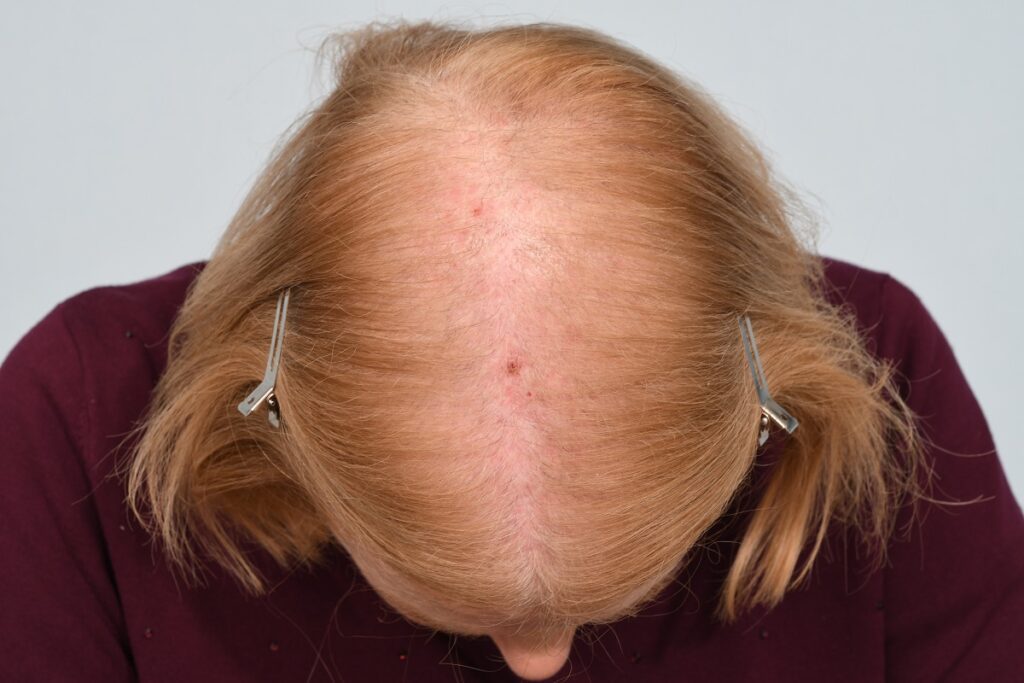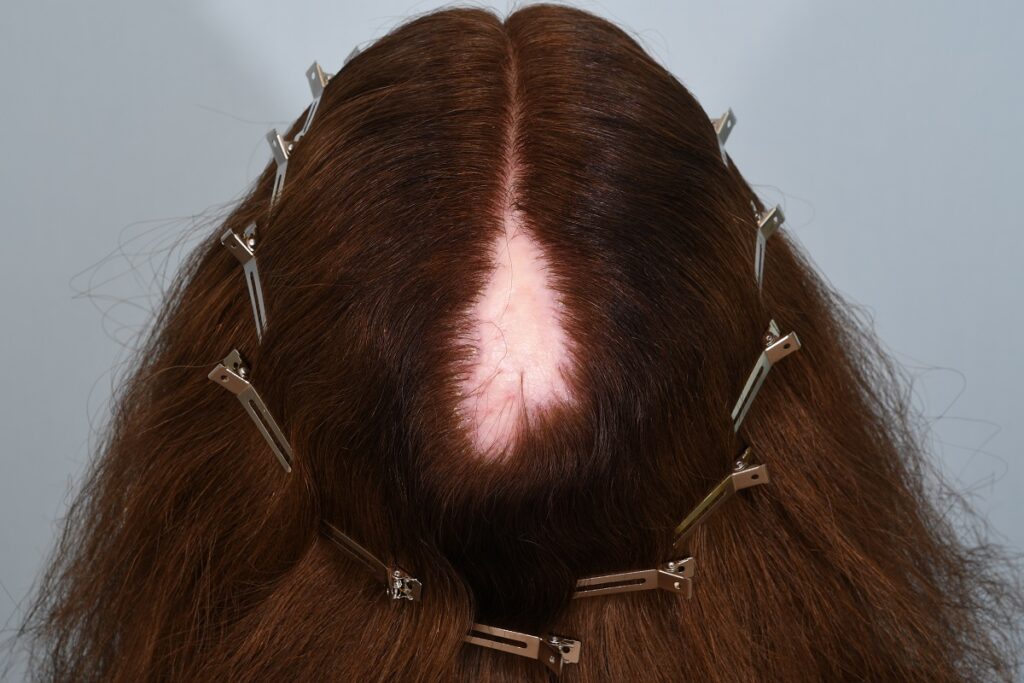The general medical term for hair loss is Alopecia. There are many types of hair loss with different causes. In most cases male hair loss is caused by hereditary male pattern baldness. There are many different causes of hair loss in women.
Hair loss is not just a physical issue. It can also have a significant psychological impact. This impact may be more obvious for women but the effects on men should not be underestimated.
How your hair loss makes you feel is an important factor in determining the right treatment choice for you.
Hair loss symptoms differ depending on the cause. Hair loss can come on suddenly or gradually and can affect just your scalp or your whole body.
Symptoms of Hair Loss
Signs and symptoms of hair loss may include:
- Gradual thinning of the hair on your head
- Bald spot or patch that grows slowly
- Receding hairline that becomes more visible over time
- Sudden loosening of the hair – Clumps of hair fall out when you comb or brush your hair
- Full-body, sudden hair loss. (This can be the result of cancer treatment)
- Signs of infection such as itching and tenderness
Many more symptoms of hair loss are internally felt by the sufferer and can have a great impact on their lives. For many patients suffering from hair loss the image in the mirror no longer matches the internal image they have of themselves, and a discontent arises. This can have a significant impact for the sufferer on their day to day lives as well as for those around them.
Causes of Hair Loss

Causes of Hair Loss in Men
In most cases male hair loss is caused by hereditary Androgenetic Alopecia, more commonly known as “male pattern baldness”. The tendency for male pattern baldness is genetically inherited from either side of the family and begins to develop after puberty.
The presence of the hormone Dihydrotestosterone (DHT), in a genetically susceptible man, is necessary for male pattern baldness to occur. There is no cure but treatment is possible.
Many myths exist regarding hair loss and baldness but it is most definitely not caused by poor circulation, clogged hair follicles, frequent shampooing, the wearing of hats and helmets or the presence of mites. Good nutrition can positively affect the quality, but not quantity, of hair.
Causes of Hair Loss in Women
There are many different causes of hair loss in women. Female pattern hair loss is still being researched, but the hormone influences in hereditary hair loss in females are suspected to be different from those in males.

Some of the less common causes of hair loss in women, which are reversible with treatment, include:
- Thyroid disease
- Iron deficiency
- High fever
- Surgery or general anaesthesia
- Crash diets
- Childbirth
- Certain medications.
There are also certain dermatologic scalp disorders that can result in temporary or permanent hair loss, such as:
- Frontal fibrosing alopecia
- Lichen planopilaris
- Alopecia areata.

Frontal Fibrosing Alopecia and Lichen planopilaris are two forms of scaring alopecia.
Hair Loss Diagnosis
Before making a diagnosis on the cause of your hair loss and recommended treatments, your doctor will likely examine you and ask about your diet, your hair care routine, and your medical and family history. You might also have tests, such as the following:
- Blood test. To help identify any medical conditions that can cause hair loss.
- Pull test. This helps determine the stage of the shedding process. Your doctor will gently pull a small number of hairs to see how many come out.
- Scalp biopsy. A scalp biopsy can be used to determine if the patient is suffering from a scarring type of hair loss. A punch biopsy is used to take a small sample of hair and skin. This can be an excellent way to support a clinical diagnosis of more complex forms of hair loss.
Hair Loss Treatment
If you are concerned about your hair loss, it is recommended that you consult with a qualified doctor who is a specialist in this area, they will determine the cause of your hair loss and recommend the appropriate treatments for your particular circumstances. Hair loss is not just a physical issue. It can also have a significant psychological impact.
It is important that you take time to think about how the loss of your hair makes you feel as this will help you make the right treatment choice for you.
Hair Loss Treatment for Men
When considering hair loss treatment for men the first stage in determining the optimal hair loss treatment option is the consultation process with a qualified doctor specialising in hair loss.
There are three possible scientifically proven courses of treatment for men suffering from male pattern hair loss. In summary, the treatment options are:
1. MEDICAL TREATMENT
There are two US Food and Drug Administration (FDA) approved medications which have proven effective as a hair loss treatment in more than 80% of male users with hair loss. These medications can slow down the hair loss process but will generally not regrow hair where it has been lost.
2. HAIR TRANSPLANT SURGERY
For those patients who are suitable candidates for hair transplant surgery, Ultra Refined Follicular Unit Transplantation (URFUT) or Follicular Unit Extraction (FUE) are the gold standard in the transplantation of hair from the back of your head (which is immune to hair loss) to the areas of your head where you need it.
Hair Transplant Surgery is a permanent hair loss treatment for men, the hair that is transplanted should not be affected by the balding process and should, therefore, be on your head for the rest of your life.
3. COMBINATION THERAPY
Combination therapy is a combination of both medical and surgical treatments. The medical treatments generally slow down the hair loss process while the surgical treatments address the areas where hair is lost and that generally will not respond to medical treatment.
Hair Loss Treatment for Women
Many women suffer from hair loss. The causes are more complex that those in men. Female hair loss can be as a result of female pattern hair loss, scarring, an underlying health condition or a dermatological condition.
For women suffering from female pattern hair loss medical treatment in combination with hair transplantation can be very successful.
Likewise hair transplantation can be very effective for female patients with hair loss from scarring as a result of accident, injury or surgery.
Patients suffering from hair loss as a result of a dermatological condition such as alopecia areata are advised to attend with a consultant dermatologist who specialises in hair loss. Treatment usually involves medical treatment and close management of the condition.
For patients with an underlying health condition that is causing their hair loss, treatment of the underlying condition is necessary in order to treat the hair loss. Attendance with your GP for onward referral to the correct specialist is advised in this case.









